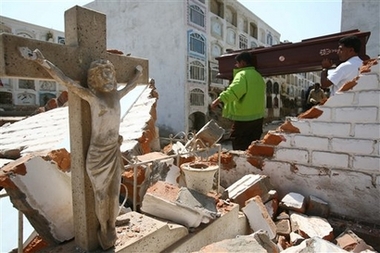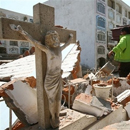Desperate search for quake victims as aftershocks rock Peru
AFP
Thu August 16, 2007
PISCO, Peru - Powerful aftershocks rattled rescuers as they clawed through rubble Friday in a desperate search for survivors two days after a massive earthquake claimed some 500 lives in Peru.
With unidentified bodies still lining the streets of Pisco and other towns in the zone worst hit from the 8.0 magnitude quake, Peruvian authorities launched an international appeal for help to back their own relief operation.
At least 300 people were said to have died in Pisco alone as Wednesday's quake destroyed scores of other buildings in the port city.
Hardest hit was the San Clemente church, which collapsed with hundreds of mourners inside at a funeral service.
Many dead were still believed to be under the rubble, although six survivors were dragged out Thursday raising hopes among rescue workers and anxious onlookers.
The head of Peru's congress, Luis Gonzales Posada, said Friday that Pisco "seems like it was bombed" after he visited the town.
"We have been evaluating the material damages and the urgent needs of the population," Gonzales Posada told RPP radio network. "We have here thousands of people we need to feed."
The Peruvian navy announced it was sending to Pisco two ships with drinking water and a hospital ship to treat the wounded.
Panic was unleashed in Pisco when a strong aftershock measuring 5.5 on the open-ended Richter scale and lasting 10 seconds, struck the region at 8:19 am (1319 GMT) Friday, according to the Peruvian Geophysical Institute.
Its epicenter was located some 200 kilometers (120 miles) south of Lima, the institute said, adding there had been some 300 aftershocks since the Wednesday quake.
Friday alone there have already been four quakes stronger than magnitude 4.0 in the Pisco area, according to the Geophysical Service.
The US Geological Survey (USGS) said Wednesday's quake was a rare and powerful 8.0 on the Moment Magnitude scale.
The overall quake death toll was between 500 and 510, according to Roberto Ognio, who heads the country's firefighters. Civil Defense authorities put the number at 437, though they expect the toll to rise, warning that many places remain isolated.
President Alan Garcia, who declared three days of national mourning, was beseiged by dozens of inhabitants begging for help as he toured Pisco, population 130,000, on Thursday.
"Mr. President, we need coffins!" cried one resident as Garcia reached a square where 50 bodies were waiting to be identified. Some inhabitants berated rescuers for not working fast enough.
The situation "is made worse by the lack of tents, food, water and medicine," said Guillermo Merino, who heads the Pisco firefighters.
Another church collapsed during a service in Ica, the provincial capital southeast of Pisco. Mayor Mariano Nacimiento said at least 70 people were killed and 800 wounded in the town, with at least four killed and dozens injured when the Senor de Luren church fell on worshippers.
Embassies in Lima were concerned about foreign nationals in Paracas, a popular tourist spot near Pisco that has been cut off since the quake, which caused a swathe of destruction along the southern coast.
Tsunamis flooded fishing villages on the Paracas bay and in Chincha, some 600 inmates fled a jail after the quake struck, authorities said.
The Peruvian government was to meet with UN agencies and representatives of donor nations at a Lima hotel on Friday morning to give a full assessment of the quake damage and its aid needs, UN officials said.
The United Nations said it was ready to help and the International Federation of the Red Cross said it sent two planes loaded with relief supplies for the earthquake victims.
Foreign governments and aid groups launched relief efforts, including Japan, Canada, Spain, Italy and France. Peru's regional neighbors have also mobilized including Ecuador, Bolivia, Brazil, Mexico, Venezuela, Colombia and Chile.
Pope Benedict XVI called for Roman Catholic organizations to provide assistance, as relief organizations including Firefighters Without Borders and Oxfam launched efforts to assist the earthquake victims.
Canada offered 1.9 million dollars (1.4 million euros) while Japan said it will send nearly 150,000 dollars and US President George W. Bush offered condolences and 100,000 dollars in emergency aid.
Peru has long lived in fear of a repeat of a 1970 earthquake that killed 70,000 people, many of whom perished in the mountain city of Huaraz which was buried by a mudslide.





 Share your thoughts in the Forum
Share your thoughts in the Forum